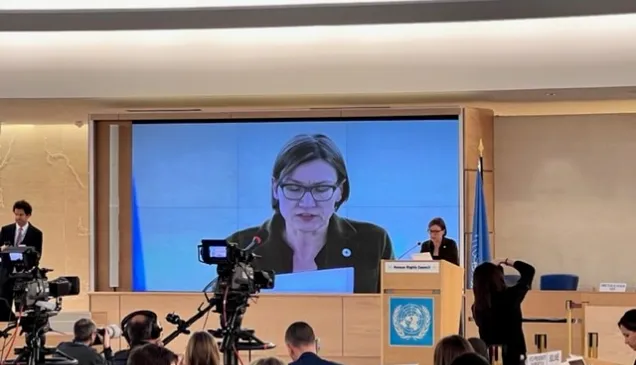United Nations, General Assembly, 71st session, Sixth Committee, statement by the ICRC, New York, October 2016.
Terrorism negates the fundamental principle of humanity and is contrary to the other underlying principles and core objectives of international humanitarian law (IHL). The International Committee of the Red Cross (ICRC) condemns acts of terrorism, whether committed within or outside armed conflict and irrespective of their perpetrators, and is deeply distressed by the devastating impact of these acts on communities and individuals.
The rise of non-State armed groups which resort to acts of terrorism is a growing concern domestically and internationally. This situation has led States and international organizations to react by tightening existing counterterrorism measures and introducing new ones.
The ICRC does not challenge the legitimacy of States to take the measures necessary to ensure their security and eliminate terrorism. Nevertheless, when such measures are taken, the safeguards protecting human life and dignity must be upheld.
In our view, the international community must be clear and firm about the need for counterterrorism activities to be conducted with full respect for the protection afforded to all individuals by international law, in particular IHL and human rights law. This is in the interest of the international community, as there is a growing recognition today that violations of these bodies of international law may exacerbate the very phenomenon that counterterrorism purports to fight. In particular, these bodies of international law must be obeyed when individuals are arrested and detained in connection with terrorism. Independent and neutral monitoring mechanisms, such as the ICRC, should be granted access to these individuals, so that they can assist the detaining authorities in ensuring that detainees are treated humanely and in conformity with applicable international law and standards.
On various occasions since 2011, the ICRC has underscored the potential adverse effects on humanitarian action of counterterrorism measures taken by States, both internationally and domestically. Such measures, in particular criminal laws, should be drafted in such a way as to ensure that they will not impede or make humanitarian action more difficult. Such action includes humanitarian engagement with non-State armed groups, even when they are designated as terrorists.
In particular, criminal laws dealing with terrorism should exclude from their scope of application activities that are exclusively humanitarian and impartial. In our view, such exclusion would be in line with the letter and spirit of IHL and therefore compatible with the obligations of States under IHL. Failure to exclude these activities would imply a rejection of the notion of neutral, independent and impartial humanitarian action, an approach that the ICRC strives to promote in its operational work in the field. It could also jeopardize the mission of impartial humanitarian organizations to protect and assist people affected by armed conflict, particularly in areas controlled by non-State armed groups.
The current perceived need to more efficiently quell the threats emanating from groups and individuals designated as terrorists has also reinvigorated States' discussion of the UN draft comprehensive convention on international terrorism. Inasmuch as this draft may include armed conflicts in its scope of application, the ICRC deems it essential to include a provision regulating its relationship to IHL. This would be the only way to minimize overlaps and contradictions between the draft comprehensive convention and IHL.
The inclusion and formulation of such a provision will be critical to maintaining the integrity of and rationale for IHL. In particular, in armed conflicts, the draft comprehensive convention should not criminalize actions that are authorized or not prohibited under IHL, such as attacking military objectives or persons not entitled to protection against direct attacks. It is our view that any agreement on the terms of the draft comprehensive convention on international terrorism should be consistent with IHL's basic principles and definitions.



